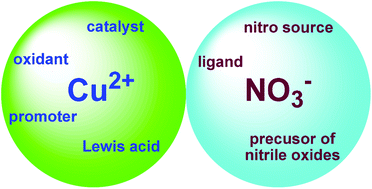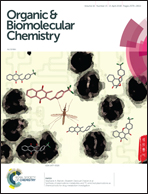Copper nitrate: a privileged reagent for organic synthesis
Abstract
Copper has been explored as an ideal candidate for replacing noble metals in organic synthesis, especially for practical large scale preparation. Recent decades have witnessed the renaissance and improvement of copper-catalyzed and copper-mediated organic reactions. Copper nitrate is a common inorganic copper salt which has been proved to be a ubiquitous reactant in organic synthesis due to its commercial availability, stability, inexpensiveness and environmentally benign nature. Copper nitrate could be used as a nitration reagent, oxidant, catalyst or promoter, and Lewis acid as well. Remarkably, great attention has been devoted to the efficient transformation of copper nitrate into functionalized or complicated compounds through various reaction types including cyclization, C–H activation, difunctionalization, nitration, rearrangement and asymmetric synthesis with chiral ligands. Further modification of copper nitrate, such as solid-supported copper nitrate or copper nitrate complexes, extends its applications in organic synthesis. The present review highlights recent advances of copper nitrate in organic synthesis, along with the mechanisms.

- This article is part of the themed collection: Synthetic methodology in OBC


 Please wait while we load your content...
Please wait while we load your content...